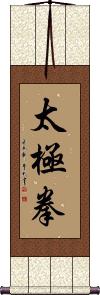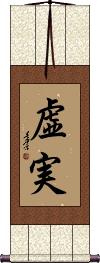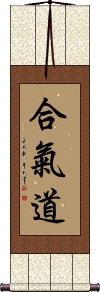Many custom options...
And formats...

Virtual in Chinese / Japanese...
Buy a Virtual calligraphy wall scroll here!
Personalize your custom “Virtual” project by clicking the button next to your favorite “Virtual” title below...
Tai Chi Chuan / Tai Ji Quan
太極拳 is the famous Taoist meditation and martial art exercise. The direct translation of these characters would be something like “grand ultimate fist,” but that does not quite hit the mark for what this title really means.
An early-morning walk through any city in China near a park or an open area will yield a view of Chinese people practicing this ancient technique.
A typical scene is an old man of no less than 80 years on this earth, with a wispy white beard and perhaps a sword in one hand. He makes slow moves that are impossibly smooth. He is steady-footed and always in balance. For him, time is meaningless and proper form, and technique is far more important than speed.
For the younger generation, faster moves may look impressive and seem smooth to the casual observer. But more discipline and mental strength are needed to create perfectly smooth moves in virtual slow motion.
Note: There are two ways to Romanize these Chinese characters, as seen in the title above. The pronunciation and actual characters are the same in Chinese. If you really used English sounds/words to pronounce this, it would be something like “tie jee chew-on” (make the “chew-on” one flowing syllable).
Kyojitsu: Falsehood and Truth
虚実 is a Japanese word that means “falsehood [and] truth” or “fiction [and] fact.”
This concept is used in warfare, gameplay, and martial arts strategies. 虚実 can be a strategy of real and/or deceptive moves. This gets to some Sun Tzu Art of War stuff where in warfare a strategic move is either a real and serious move or it is a deceptive blow.
Let's explore each character in more depth:
虚 was originally written 虛 (there is a very subtle difference in the strokes at the bottom of the character) and means unpreparedness, falsehood, emptiness, void, abstract theory, empty or unoccupied, diffident or timid, false, humble or modest, virtual, or in vain.
In the Buddhist context, 虛 represents the Pali/Sanskrit word “śūnya,” meaning empty, vacant, unreal, unsubstantial, untrue, space, humble, or in vain.
In ancient Eastern/Chinese astronomy, 虛 represents the “Emptiness” constellation (one of the 28 mansions in the sky).
実 was originally 實 in Chinese (they currently write it as 实 in Simplified Chinese) with the meaning, truth, reality, sincerity, honesty, fidelity, and substance.
The Buddhist context is similar, adding real, true, honest, really, solid, definitely, sincere, solid, fixed, full, to fill, fruit, kernel, verily, in fact, the supreme fact, or ultimate reality to the definition.
Hapkido
Korean Martial Art of re-directing force
Hapkido or 合氣道 is a mostly-defensive martial art in Korea.
Hapkido has some connection to the Aikido of Japan. They are written with the same characters in both languages. However, it should be noted that the Korean Hanja characters shown here are the traditional Chinese form - but in modern Japan, the middle character was slightly simplified.
Note: You can consider this to be the older Japanese written form of Aikido. Titles on older books and signs about Aikido use this form.
The connection between Japanese Aikido and Korean Hapkido is muddled in history. The issue is probably due to the difficult relationship between the two countries around WWII. Many Koreans became virtual slaves to the Japanese during that period. After WWII, many things in Korea were disassociated from having any Japanese origin. The relationship has greatly mellowed out now.
Looking at the characters, the first means “union” or “harmony.”
The second character means “universal energy” or “spirit.”
The third means “way” or “method.”
One way to translate this into English is the “Harmonizing Energy Method.” This makes sense, as Hapkido has more to do with redirecting energy than fighting strength against strength.
More Hapkido info
More notes:
1. Sometimes Hapkido is Romanized as “hap ki do,” “hapki-do” “hab gi do” or “hapgido.”
2. Korean Hanja characters are actually Chinese characters that usually hold the same meaning in both languages. There was a time when these characters were the standard and only written form of Korean. The development of modern Korean Hangul characters is a somewhat recent event in the greater scope of history. There was a time when Chinese characters were the written form of many languages in places known in modern times as North Korea, South Korea, Japan, Vietnam, Singapore, Hong Kong, Taiwan, Mainland China, and a significant portion of Malaysia. Even today, more people in the world can read Chinese characters than English.
3. While these Korean Hanja characters can be pronounced in Chinese, this word is not well-known in China and is not considered part of the Chinese lexicon.
Not the results for virtual that you were looking for?
Below are some entries from our dictionary that may match your virtual search...
| Characters If shown, 2nd row is Simp. Chinese |
Pronunciation Romanization |
Simple Dictionary Definition |
虛 虚 see styles |
xū xu1 hsü kyo |
emptiness; void; abstract theory or guiding principles; empty or unoccupied; diffident or timid; false; humble or modest; (of health) weak; virtual; in vain śūnya. Empty, vacant; unreal, unsubstantial, untrue; space; humble; in vain. |
VM see styles |
bui emu; buiemu(sk) ブイ・エム; ブイエム(sk) |
{comp} (See 仮想マシン) VM; virtual machine |
VR see styles |
bui aaru; buiaaru(sk) / bui aru; buiaru(sk) ブイ・アール; ブイアール(sk) |
{comp} VR; virtual reality |
仮想 see styles |
kasou / kaso かそう |
(n,vs,vt,adj-no) imagination; supposition; virtual; potential (enemy) |
假想 see styles |
jiǎ xiǎng jia3 xiang3 chia hsiang kesō |
imaginary; virtual; to imagine; hypothesis figurative words |
呼出 see styles |
hū chū hu1 chu1 hu ch`u hu chu yobidashi よびだし |
to exhale; to breathe out; to make an outgoing call; (computing) to bring up (a menu, search bar, virtual keyboard etc) (irregular okurigana usage) (noun/participle) (1) call; summons; paging; curtain call; (2) (sumo) usher who calls the names of wrestlers, sweeps the ring, etc.; (3) (abbreviation) telephone number at which a person without a telephone can be reached; (4) (archaism) box-shaped area containing clean water for rinsing oneself (in an Edo-period bathhouse); (5) (archaism) high-ranking prostitute in the Yoshiwara district (Edo period); (6) (archaism) unlicensed prostitute in the Fukagawa red-light district (Edo period) |
實體 实体 see styles |
shí tǐ shi2 ti3 shih t`i shih ti jitsutai |
entity; substance; thing that has a material existence (as opposed to a conceptual, virtual or online existence); the real thing (as opposed to an image or model of it) substance |
無形 无形 see styles |
wú xíng wu2 xing2 wu hsing mukei / muke むけい |
incorporeal; virtual; formless; invisible (assets); intangible (adj-no,n) formless; immaterial; intangible; incorporeal; abstract; moral; spiritual immaterial |
等妙 see styles |
děng miào deng3 miao4 teng miao tō myō |
The two supreme forms of Buddha-enlightenment 等覺 and 妙覺, being the 51st and 52nd stages of the Mahāyāna 階位. A Buddha is known as等妙覺王, king of these two forms of universal and supernatural illumination. |
虚像 see styles |
kyozou / kyozo きょぞう |
(noun - becomes adjective with の) (1) {physics} (See 実像・じつぞう・1) virtual image; (noun - becomes adjective with の) (2) (See 実像・じつぞう・2) false image; pretense; pretence |
虛像 虚像 see styles |
xū xiàng xu1 xiang4 hsü hsiang |
virtual image See: 虚像 |
虛擬 虚拟 see styles |
xū nǐ xu1 ni3 hsü ni |
to imagine; to make up; fictitious; theoretical; hypothetical; (computing) to emulate; (computing) virtual |
課金 课金 see styles |
kè jīn ke4 jin1 k`o chin ko chin kakin かきん |
tax levied on a conquered people by an army; fee for a divination session; variant of 氪金[ke4 jin1], in-app purchase (gaming) (n,vs,vi) (1) charging (a fee); billing; charge; (n,vs,vi) (2) (colloquialism) paying for virtual goods or premium features (in a video game, on a social networking service, etc.); microtransaction |
VDI see styles |
bui dii ai; buidiiai(sk) / bui di ai; buidiai(sk) ブイ・ディー・アイ; ブイディーアイ(sk) |
{comp} virtual desktop infrastructure; VDI |
VPN see styles |
bui pii enu; buipiienu(sk) / bui pi enu; buipienu(sk) ブイ・ピー・エヌ; ブイピーエヌ(sk) |
{comp} virtual private network; VPN |
VPS see styles |
bui pii esu; buipiiesu(sk) / bui pi esu; buipiesu(sk) ブイ・ピー・エス; ブイピーエス(sk) |
{comp} (See 仮想専用サーバー) virtual private server; VPS |
バ美肉 see styles |
babiniku バびにく |
(net-sl) (abbr. of バーチャル美少女受肉 or バーチャル美少女セルフ受肉) creation and use of a virtual female avatar |
仮想局 see styles |
kasoukyoku / kasokyoku かそうきょく |
{comp} virtual (switching) office |
仮想的 see styles |
kasouteki / kasoteki かそうてき |
(adjectival noun) {comp} virtual |
無課金 see styles |
mukakin むかきん |
(See 課金・2) not paying for virtual goods or premium features (in a video game, on a social networking service, etc.); free-to-play player; F2P player |
百度幣 百度币 see styles |
bǎi dù bì bai3 du4 bi4 pai tu pi |
virtual currency created by Baidu |
等覺位 等觉位 see styles |
děng jué wèi deng3 jue2 wei4 teng chüeh wei tōgaku i |
stage of virtual enlightenment |
虛擬機 虚拟机 see styles |
xū nǐ jī xu1 ni3 ji1 hsü ni chi |
virtual machine |
虛粒子 虚粒子 see styles |
xū lì zǐ xu1 li4 zi3 hsü li tzu |
virtual particle |
虛電路 虚电路 see styles |
xū diàn lù xu1 dian4 lu4 hsü tien lu |
virtual circuit; VC |
重課金 see styles |
juukakin / jukakin じゅうかきん |
spending heavily on virtual goods or premium features (in a video game, on a social networking service, etc.) |
3D酔い see styles |
suriidiiyoi / suridiyoi スリーディーよい |
virtual reality sickness; 3D sickness |
MVNO see styles |
emu bui enu oo; emubuienuoo(sk) エム・ブイ・エヌ・オー; エムブイエヌオー(sk) |
{telec} mobile virtual network operator; MVNO |
Siri see styles |
shiri シリ |
(product) Siri (virtual assistant developed by Apple); (product name) Siri (virtual assistant developed by Apple) |
VCPI see styles |
bui shii pii ai; buishiipiiai(sk) / bui shi pi ai; buishipiai(sk) ブイ・シー・ピー・アイ; ブイシーピーアイ(sk) |
{comp} Virtual Control Program Interface; VCPI |
Click here for more virtual results from our dictionary
The following table may be helpful for those studying Chinese or Japanese...
| Title | Characters | Romaji (Romanized Japanese) | Various forms of Romanized Chinese | |
| Tai Chi Chuan Tai Ji Quan | 太極拳 太极拳 | tai kyoku ken taikyokuken | tài jí quán tai4 ji2 quan2 tai ji quan taijiquan | t`ai chi ch`üan taichichüan tai chi chüan |
| Kyojitsu: Falsehood and Truth | 虚実 | kyo jitsu / kyojitsu | ||
| Hapkido | 合氣道 合气道 | ai ki do / aikido | hé qì dào he2 qi4 dao4 he qi dao heqidao | ho ch`i tao hochitao ho chi tao |
| In some entries above you will see that characters have different versions above and below a line. In these cases, the characters above the line are Traditional Chinese, while the ones below are Simplified Chinese. | ||||
Successful Chinese Character and Japanese Kanji calligraphy searches within the last few hours...






